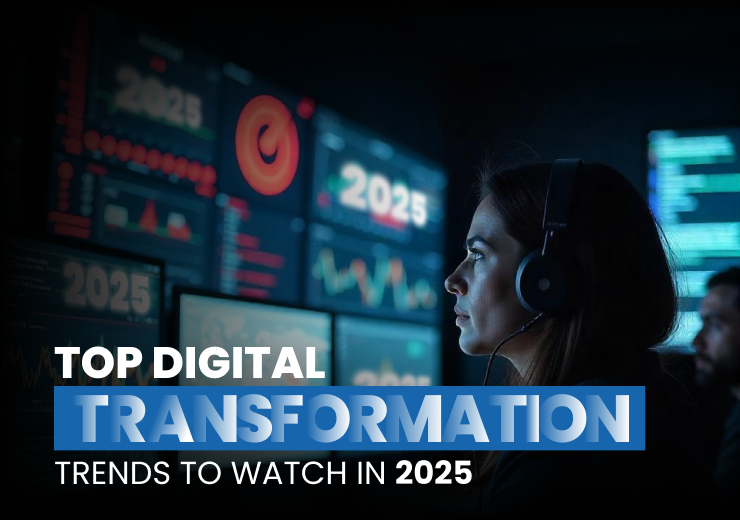- Admin
- May 30th, 2025
- 4 min Read
Top Digital Transformation Trends to Watch in 2025
In 2025, digital transformation will no longer be a buzzword—it will be the defining factor of business survival and success. As organizations across the globe race to innovate, the convergence of emerging technologies like AI, automation, cybersecurity, and cloud computing is reshaping every industry.
At Contrivance, we help businesses harness these transformations with future-ready IT infrastructure, custom software development, and intelligent automation solutions. In this blog, we’ll explore the top digital transformation trends of 2025 you can’t afford to ignore.
1. Hyperautomation Will Redefine Operational Agility
Hyperautomation—the integration of AI, RPA (robotic process automation), ML, and analytics—is becoming a key enabler for enterprises seeking end-to-end digital operations. In 2025, organizations will move beyond automating repetitive tasks and focus on intelligent decision-making, process mining, and self-healing systems.
Key Insight: Businesses that embrace hyperautomation will significantly reduce costs, increase accuracy, and improve speed across departments like finance, HR, customer support, and supply chain.
2. AI and Cognitive Tech Will Power Smarter Business Models
Artificial Intelligence is moving from experimentation to real-world deployment across industries. From predictive analytics in retail, chatbots in healthcare, to fraud detection in finance, AI will enhance real-time decision-making and customer personalization.
3. Edge Computing Will Take Center Stage
As IoT devices and real-time analytics become widespread, edge computing will emerge as the next evolution of cloud strategy. Instead of sending data to a central cloud, edge computing processes it closer to the source—reducing latency, enhancing speed, and improving data security.
In 2025, expect industries like healthcare, manufacturing, and logistics to lead the charge in adopting edge-powered infrastructures.
4. Cybersecurity Becomes Business-Critical
With more data being generated and shared across networks, cybersecurity is no longer just an IT concern—it’s a business enabler. In 2025, businesses will invest in zero-trust architectures, AI-driven threat detection, and regulatory compliance automation.
According to IDC, by 2025, 60% of enterprises will make cybersecurity an essential part of board-level discussions.
5. Industry-Specific Solutions Will Surge
Digital transformation is no longer “one-size-fits-all.” In 2025, solutions tailored to specific industries—healthcare, finance, logistics, education, etc.—will dominate the tech landscape. These vertical-specific platforms are more scalable, compliant, and aligned with real operational challenges.
6. Sustainable Tech Will Drive Green Innovation
With ESG (Environmental, Social, Governance) goals gaining traction, companies will adopt green technologies, energy-efficient data centers, and sustainability dashboards that track their environmental impact.
Businesses aligning digital transformation with sustainability goals will not only meet regulations but also appeal to conscious consumers and investors.
7. Cloud-Native Architectures Will Dominate Modern Development
In 2025, businesses will shift more aggressively toward cloud-native technologies like microservices, containers (e.g., Kubernetes), and serverless computing. These solutions allow for faster development, easier scalability, and better resilience.
8. Remote and Hybrid IT Infrastructure Will Mature
Work-from-anywhere is the new normal. In 2025, businesses will invest heavily in remote infrastructure management (RIM), cloud desktops, and automated monitoring tools to support hybrid workplaces without compromising performance or security.
Key Takeaways for Businesses
- Digital transformation is not a destination—it’s a continuous evolution.
- 2025 will be marked by automation, AI, secure infrastructure, industry-specific platforms, and sustainability
- Businesses that act early and partner with the right technology providers will gain a decisive competitive edge.



